How to create a weight loss onboarding form

Use the Formsort weight loss template to get started with your onboarding process
Struggling with weight might be a universal problem but effectively managing weight loss requires highly individualized strategies, especially if you want the results to last. That’s why when it comes to weight loss programs, having a comprehensive onboarding process is more than just paperwork; it's a critical step in ensuring personalized care. Gathering detailed patient information is the cornerstone of designing effective weight loss plans.
When building a weight loss onboarding form, you want to include essential questions relating to:
- Contact and personal information
- Health history and lifestyle information
- Goals and challenges
- Diet and exercise preferences
You might also have questions unique to your program or need to qualify patients for appropriate weight loss treatments. You can streamline your form build by starting with a template and tailoring it to your business needs.
In this article, we’ll explain the key features of the new Formsort weight loss onboarding form template. Obtain basic information, qualify patients, and follow industry regulations with the template. Then tailor questions for your clientele and customize the design for your brand identity.
The need for a comprehensive weight loss patient onboarding
Providing weight loss solutions demands a nuanced understanding of your patient health profiles as well as ensuring you’re qualifying the right patients. Leverage a comprehensive weight loss patient onboarding form to optimize your health data collection and qualification process.
Gather essential patient information
To provide customized weight loss services, you’ll need to obtain basic patient information like contact and personal data, medical profile, insurance details, and weight loss goals. With a Formsort template that includes these standard questions, you have a head start in developing your form. Add more specific questions and customize the design to create the customized form experience you want.
Qualify patients for personalized care
One size does not fit all in weight loss plans and not everyone can benefit from every strategy. You might need to qualify patients based on metrics like age, body mass index (BMI), and existing medical conditions. Or you might be licensed in certain states. Use the qualification step to filter applications based on health data or geographics.
High-value components of weight loss patient onboarding
With the success of your patients’ weight loss journeys depending on a plan tailored to their unique needs, you’ll want to get more than just their basic information. The onboarding form is an opportunity to gather information that will provide a comprehensive understanding of your patients’ lifestyle, medical history, and nutritional habits.
Medical assessment
Every patient has a unique medical history. Gather this information in a medical assessment and evaluate it to ensure safe and effective weight loss plans. Key components include:
- Height and weight: Use the patient’s height and weight to calculate their BMI and set realistic weight loss goals.
- Existing medical conditions: Identify conditions that may impact weight loss strategies and might disqualify patients from enrolling in your program.
- Medications and allergies: Document current medications and potential allergens.
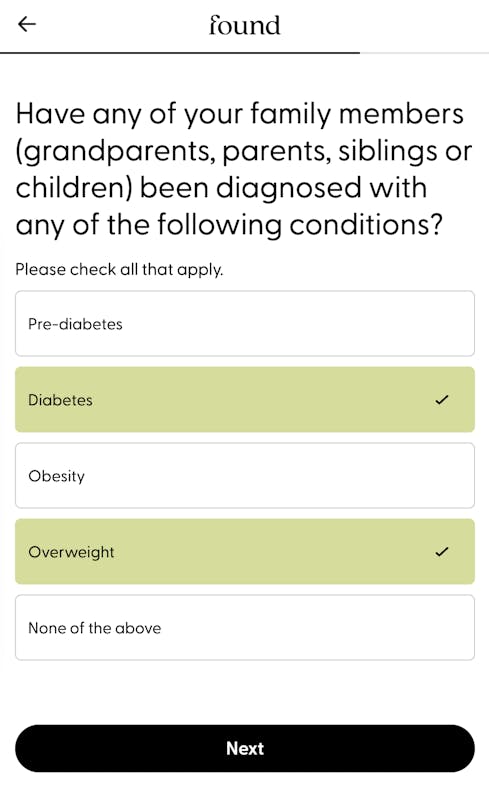
Lifestyle assessment
By learning about your patients' daily lives you can gain valuable insights into the factors that can either propel or hinder their weight loss journey. Implement a lifestyle assessment to ask about:
- Physical activity: Gauge their current activity levels, exercise routines and preferences.
- Sleep patterns: Explore their sleep habits, identifying potential areas for improvement.
- Stress management: Assess stressors and coping mechanisms, acknowledging the impact on weight management.
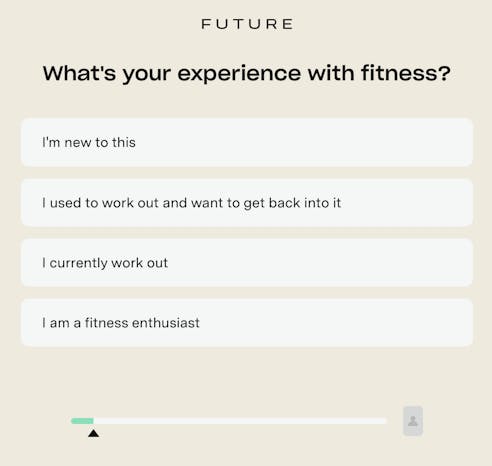
Nutrition/diet assessment
Nutrition is at the core of successful weight management. Use data from a diet assessment to create sustainable nutrition plans that align with your patients’ tastes and preferences. Questions can touch upon:
- Dietary habits: Explore their current eating patterns and identify areas for improvement.
- Food preferences: Understand their likes and dislikes to create enjoyable and realistic meal plans.
- Nutritional knowledge: Assess their understanding of nutrition, providing education where needed.
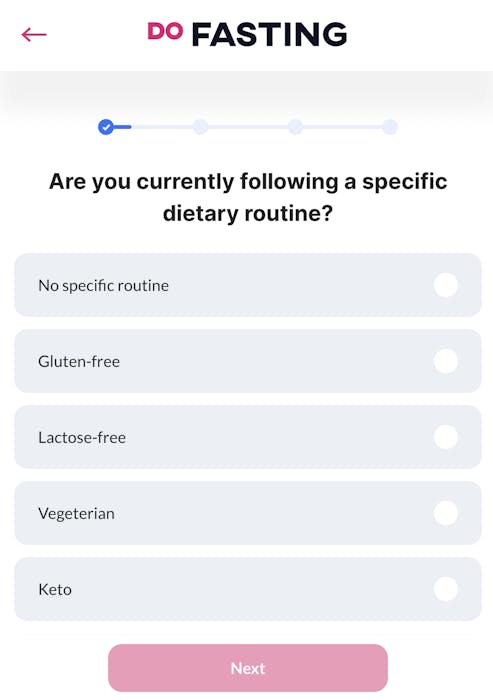
Weight loss patient onboarding best practices
While weight management onboarding forms can vary greatly from company to company, there are best practices to streamline the onboarding experience and cultivate a foundation for a trusting and successful weight loss partnership. They include:
Define your qualification criteria: who you can help and how
Qualification in weight loss programs involves setting specific criteria based on age, BMI levels, and potential disqualifying medical conditions like a heart condition or thyroid issues. Most weight loss programs might be inappropriate for pregnant women. However, some are specifically tailored for that demographic. You want to set the filters that are right for your target population. By establishing these parameters, you ensure that your expertise is directed where it can be most effective, setting safe, realistic expectations for both you and your patients.
Focus on gathering essential information
It can be tempting to gather copious amounts of data. However, by identifying and collecting only the information necessary for effective care, you create a streamlined process that saves everyone time and doesn’t overwhelm patients.
Approach with sensitivity
Weight loss often involves sensitive topics, such as personal habits, lifestyle choices, and medical conditions. Approach these discussions with empathy and sensitivity. Craft your questions thoughtfully so that patients feel understood, respected, and supported throughout the onboarding process.
Personalize the onboarding experience
Your patients are unique so personalize the onboarding experience by asking relevant questions based on the answers they provide. Use conditional logic to display only relevant questions. This tailored approach not only fosters a sense of individualized care but also enhances the effectiveness of your weight loss strategies.
Maintain HIPAA compliance & safeguard patient privacy
Privacy is non-negotiable in healthcare. Ensure that your onboarding process adheres to HIPAA regulations, safeguarding patient confidentiality and securing their trust. Implement secure data storage and transmission practices to protect sensitive patient information.
Guide users through the process: set expectations
A transparent onboarding process helps patients feel more informed and comfortable as they start on their weight loss journey. You can create transparency by guiding users through what to expect, outlining the steps, duration, and any potential follow-ups. This demystifies the process and establishes trust. Progress bars give responders a sense of where they are in a form and how long it might take to finish. The Waybetter form explains the way patient-provided data is used to understand them better. Knowing why certain detailed questions are asked can encourage patients to take the time and answer accurately.
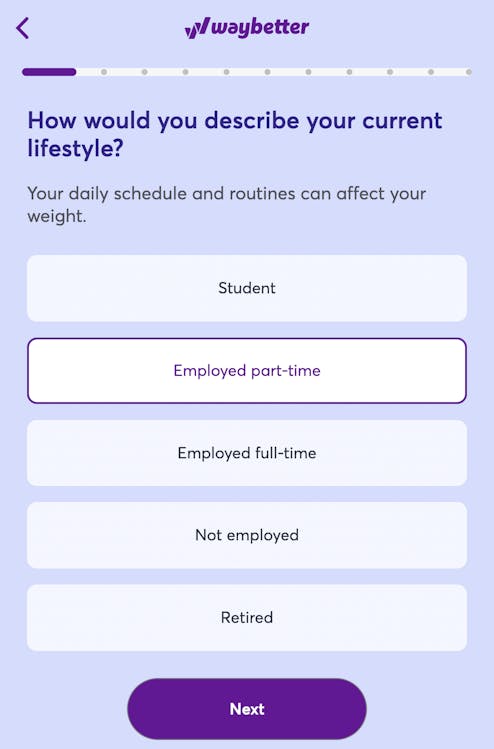
Experiment and optimize
Continuously improve your form by experimenting with different onboarding approaches and optimizing based on feedback and outcomes. Regularly evaluate the effectiveness of your onboarding process, seeking ways to enhance patient experience and the overall success of your weight loss programs.
Building a patient onboarding with Formsort's weight loss template
Start building your weight loss onboarding form by clicking +New flow > Pick a template > Weight loss patient onboarding form.
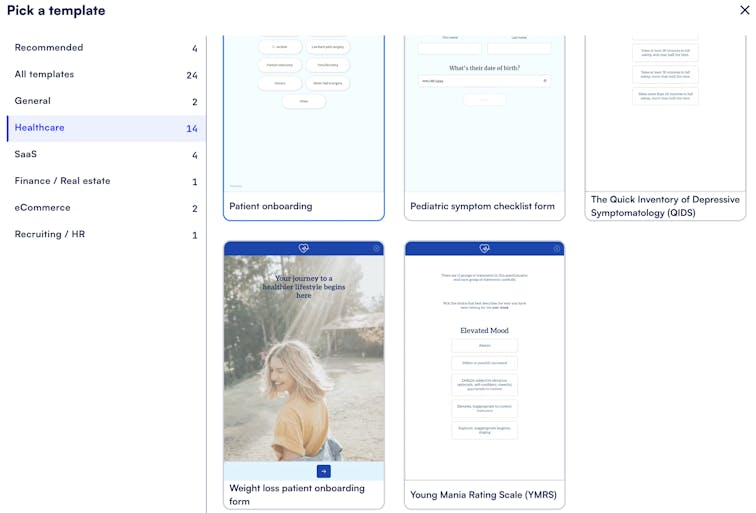
The weight loss template has four built-in sections: Intro, Medical info, Disqualify, and Qualify. The intro starts with a welcome interstitial and questions including the patient’s weight loss goal, date of birth, sex, and insurance. You might want to add questions about the patient’s name, address, or other data you prioritize. The medical info section asks for responders’ height, weight, and medical conditions.
Conditional logic lets you personalize the form journey for your responders. Use the disqualify and qualify sections to redirect them to the appropriate next steps. You can adjust the age limit or medical conditions that would disqualify prospective patients. A qualified patient can be directed to additional questions to complete onboarding.
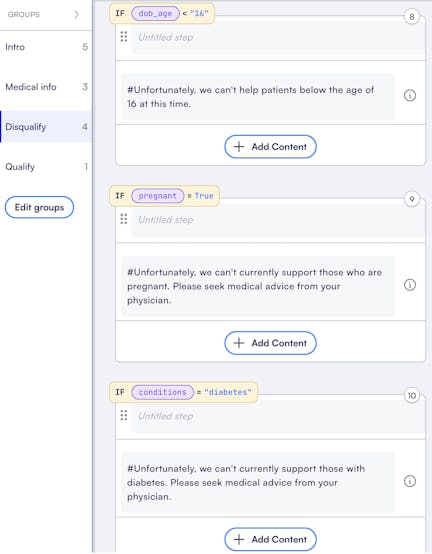
Body mass index (BMI)
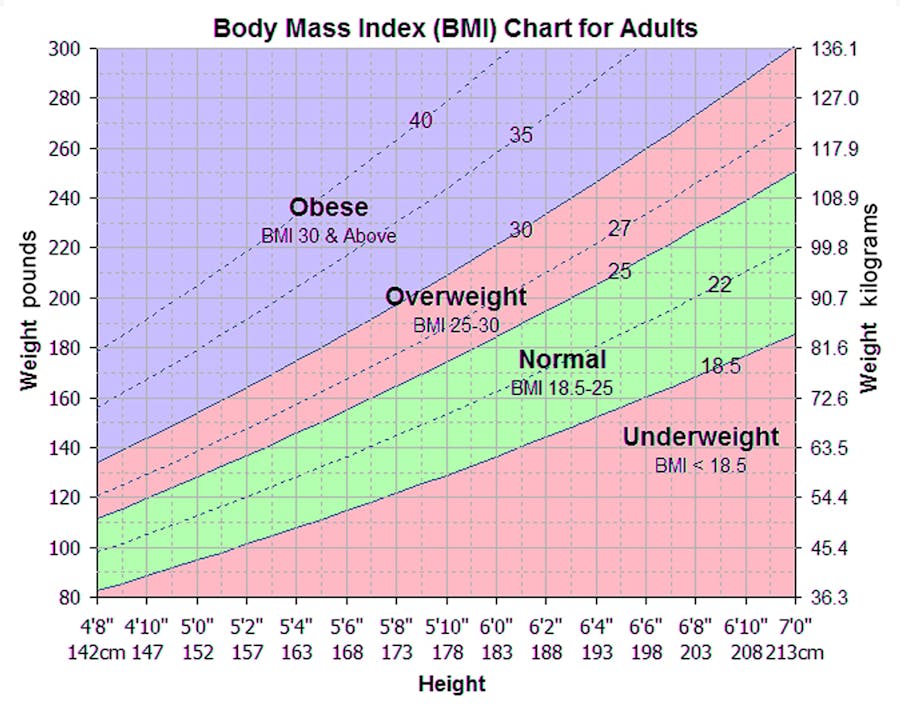
Source: https://healthjade.net/what-is-body-mass-index/
When it comes to weight loss, BMI can be an important factor in developing treatment plans. A Formsort built-in BMI calculated variable can use the responder’s height and weight to determine their BMI. You can use this information to qualify patients and route them to the best program for them.
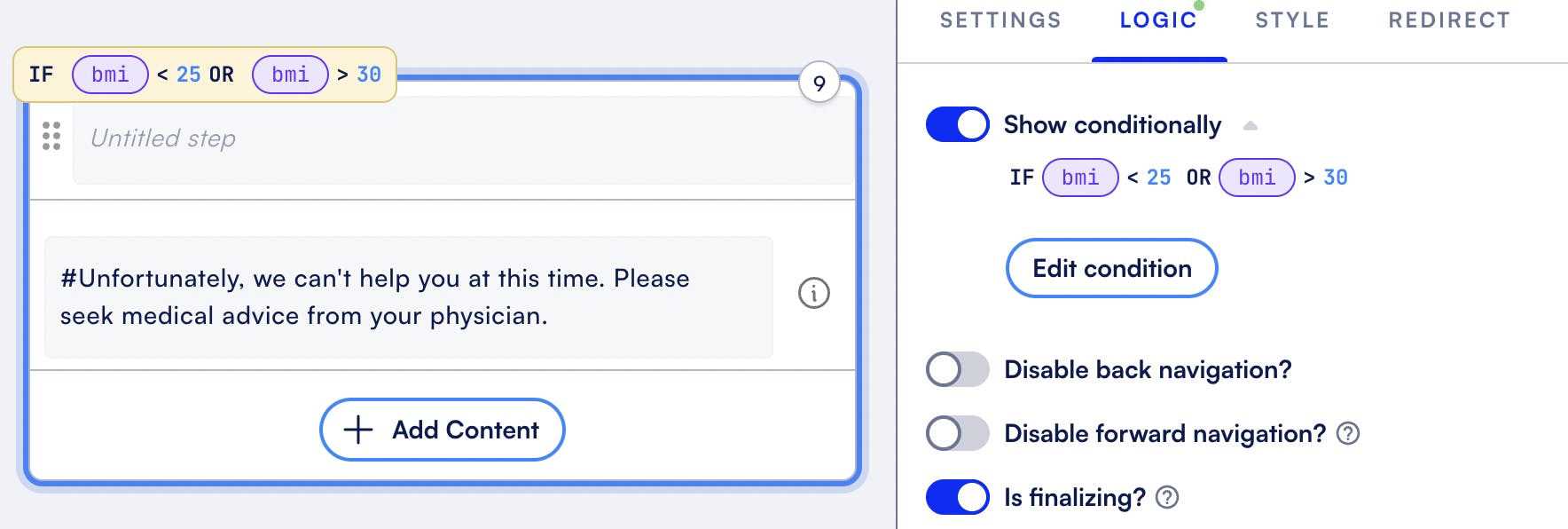
Example of weight-loss companies using Formsort's form builder
For Formsort customers, optimized onboarding forms are a key ingredient for success, helping increase conversion rates and collecting valuable data needed to provide effective weight loss support. Let’s take a closer look at some examples:
Waybetter’s gamified weight loss maximizes customer motivation. Their onboarding form prioritizes goal setting that is achievable based on responders’ height, weight, and ultimate weight loss goal.
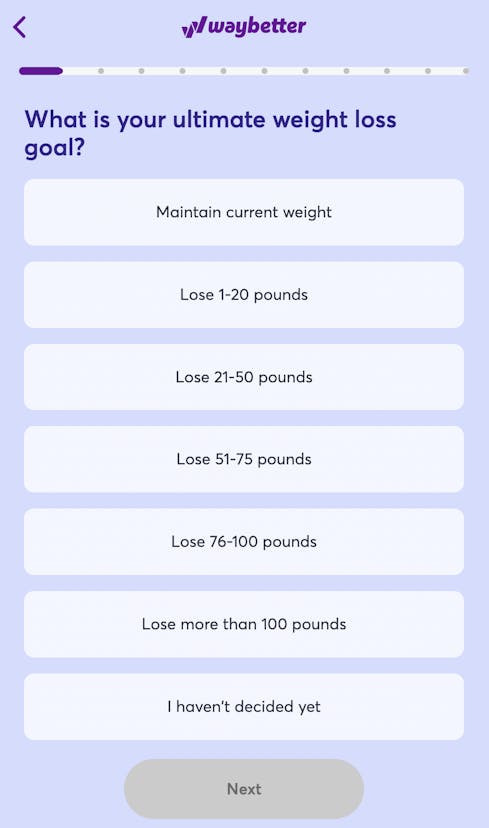
GLP-1 patient intake form
Form Health, a weight loss company, offers Zepbound (GLP-1 based) as one of their treatment plans, tailoring their solutions based on patients’ medical history, lifestyle and preferences. The company has created a 5-minute quiz, powered by Formsort, to help determine if potential patients meet the criteria for Form Health’s medical weight loss program, and whether their insurance will cover FORM program costs.
Glucagon-Like Peptide-1 (GLP-1) therapies like Ozempic and Wegovy have transformed weight loss management over the last decade. Recently, the FDA has approved a new weight loss drug, Zepbound, that combines GLP-1 and GIP-based treatments. As such, it is essential for weight loss companies using GLP-1 to have a comprehensive patient intake form to collect relevant medical background information from their clients and qualify the patients accordingly.
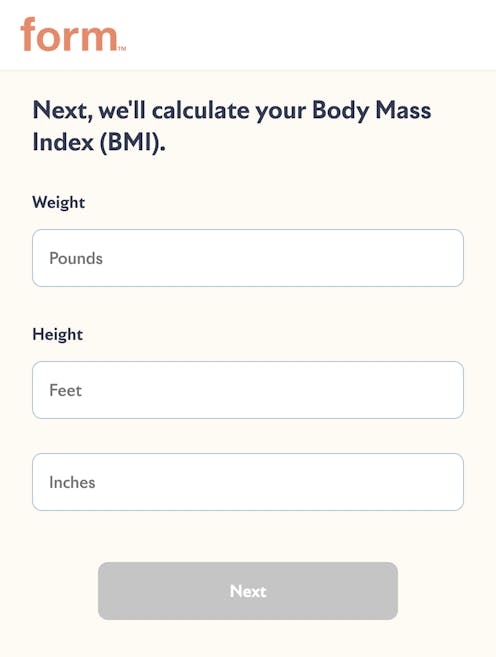
Tracking patient progress with check-in forms
When it comes to innovative medical solutions, progress monitoring is essential for ensuring the treatment is effective and identifying any side effects. “We clearly need to get more specific with the patients that get this drug, have better systems to support them when they’re on it, and employ better means of tracking what’s happening during and after treatment.” says Nikhil Krishnan from OutOfPocket.
The effectiveness and safe usage of GLP-1 and other groundbreaking treatments rely significantly on accurate patient monitoring and personalized adjustments. Forms can be a powerful tool for tracking essential metrics over the course of a patient’s weight loss journey. For example, once your patient starts a treatment plan, having them complete check-in forms at regular intervals will give you data about the treatment’s effectiveness, side effects, and any unforeseen outcomes. Not only is this information valuable for the individual patient’s care, but it also contributes to a comprehensive body of data about your entire patient population. You’ll be able to identify trends, refine treatment protocols, and add to ongoing research on the efficacy of the intervention.
Jumpstart your builds with customizable Formsort templates
As a weight loss healthcare provider, you know how vulnerable your clients might feel. Shame, social stigma, and the exhausting roller coaster of their weight loss history all make it critical for you to handle their onboarding journeys with expertise and sensitivity. To ensure long term success, you need to provide personalized care based on your knowledge of their physical profile, medical history, goals and challenges.
Collect these important data points with the Formsort weight loss template so you can provide the best care. You can also track your patients’ progress using check-in forms. Formsort offers a range of templates to help you streamline your form-build process.